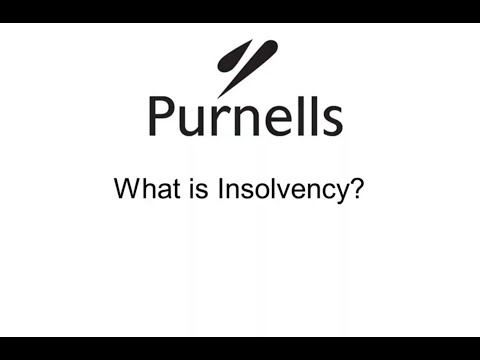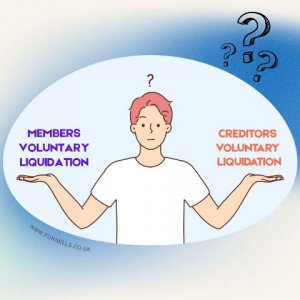What is Insolvency?
Legal Definition and Signs of Company Insolvency
Insolvency: A Complete Guide for Individuals and Businesses
What is Insolvency?
Insolvency refers to a situation where an individual or business is unable to pay their debts as they fall due. When financial obligations surpass available assets or cash flow, insolvency can occur leading to serious legal and financial consequences. This condition can arise from a variety of factors, including poor financial management, economic downturns, or excessive debt.
Insolvency is different from bankruptcy, although the two terms are often used interchangeably. Insolvency is a financial state, while bankruptcy is a legal process that can be initiated when insolvency is declared for an individual.
What is the legal definition of Insolvency?
The legal definition of Insolvency is set out in Section 123 of The Insolvency Act 1986 and also sets out two tests to consider whether a company is insolvent.
- The Balance Sheet Test says that if a company’s liabilities are greater than its assets then it is insolvent.
- The Cashflow Test says that a company is insolvent if it is unable to pay its debts as and when they fall due. Or put simply, creditors are chasing for amounts that are owed to them, and there are insufficient monies to pay them at the time. Therefore, while a company may have significant capital assets, if it does not have sufficient cash to pay a bill when it falls due then it is considered insolvent.
Case Law
There has been a lot of debate and case law over the years as to which test is the most appropriate in any given circumstance and the leading case is BNY Corporate Trustee Services Limited v Eurosail 2007 3BL plc, which is often called the Eurosail case.
Eurosail said that if a company had ceased to trade, or was unlikely to have any further income, then the most appropriate test to determine insolvency would be the balance sheet test, and if its liabilities exceed its assets, including contingent liabilities, then the Company would be Balance Sheet insolvent.
However if the Company was going to continue to trade and was likely to receive further income, then the cashflow test would be the most appropriate option to determine the Company's insolvency.
Types of Insolvency
Insolvency can take many forms, depending on whether it involves individuals or businesses. Understanding the different types is crucial to addressing the problem appropriately.
1. Personal Insolvency
Personal insolvency occurs when an individual can no longer meet their debt obligations. This can happen due to unexpected life events such as a job loss, medical emergencies, or poor financial planning. Common outcomes for individuals facing insolvency include:
These options provide individuals with ways to manage or discharge their debts.
2. Corporate Insolvency
Corporate insolvency refers to the financial distress of a business, typically a limited company, that cannot pay off its debts. Businesses facing insolvency may need to pursue various options, including:
- Company Voluntary Arrangements (CVAs): A formal agreement between a business and its creditors to settle debts over time.
- Administration: When a company’s management is temporarily taken over by an appointed administrator to rescue the business or liquidate its assets.
- Liquidation: The sale of a company’s assets to pay creditors when the business is no longer viable.
3. Cross-border Insolvency
In today's global economy, businesses may have operations in multiple countries, which means insolvency can also be a cross-border issue. Cross-border insolvency refers to situations where a company’s debts and assets span multiple jurisdictions. This can complicate the resolution process, and international agreements like the UNCITRAL Model Law on Cross-Border Insolvency may apply.
Causes of Insolvency
Insolvency can be caused by numerous factors, many of which are beyond an individual or business’s control. Some of the typical causes of insolvency include:
- Excessive Borrowing: Borrowing beyond your ability to repay can quickly lead to insolvency.
- Declining Revenue: A significant drop in income from business operations or investment returns can result in insolvency.
- Rising Costs: An increase in expenses, such as wages, rent, or utility bills, can strain finances and lead to insolvency.
- Poor Cash Flow Management: Failure to properly track and manage cash flow is one of the most common causes of insolvency for businesses.
- Political Changes: Changes in government policy in terms of regulation and tax can often put companies and businesses under serious pressure and can result in insolvency.
- Unforeseen Circumstances: Natural disasters, economic recessions, or personal health crises can also lead to insolvency.
Signs of Insolvency
Typical signs of insolvency, and particularly cash flow insolvency are:
- The company is constantly juggling which creditor to pay over another.
- The company is “robbing Peter to pay Paul.”
- There are arrears with HM Revenue and Customs or the landlords.
- The company is constantly making late payments or extending credit terms.
- The company knows there is a liability falling due in the future and there is no prospect of having funds to pay it.
- There are threats of Court action, statutory demands or winding up petitions.
- A statutory demand or winding up petition has been issued and cannot be paid immediately.
If any of these signs are present then it may be a good idea to speak to a Licensed Insolvency Practitioner to obtain advice on the Company’s finances and the options available to it.
How to Deal With Insolvency
If you or your business is facing insolvency, there are several options for addressing the situation. These solutions vary depending on whether you're an individual or a company.
1. Personal Insolvency Solutions
- Debt Management Plans (DMPs): A structured repayment plan where you pay off your debts over time. DMPs are often negotiated with creditors, allowing you to reduce monthly payments.
- Individual Voluntary Arrangements (IVAs): A formal agreement between you and your creditors to repay a portion of your debts over a fixed period, usually five years. At the end of the IVA, any remaining unsecured debt will be written off.
- Bankruptcy: For individuals who cannot repay their debts, bankruptcy may be the only solution. This involves legally declaring that you cannot meet your financial obligations. Bankruptcy typically lasts for a period of one year, and after that, your remaining debts are discharged.
2. Business Insolvency Solutions
- Company Voluntary Arrangement (CVA): This allows a company to continue trading while making regular payments to creditors, or offering them a lump sum. A CVA is negotiated with the creditors and is supervised by an insolvency practitioner.
- Administration: A business can enter administration if it is no longer viable. An administrator is appointed to try and rescue the business, reorganise its finances, or sell the company’s assets to pay off creditors. It can also be used as a stepping stone to other insolvency procedures.
- Liquidation: If a company is unable to recover from insolvency, liquidation may be necessary. This process involves selling off the company’s assets to settle its debts. There are two types of liquidation: Creditors Voluntary Liquidation (initiated by the company’s directors) and Compulsory Liquidation (ordered by a court).
What should you do if your company is insolvent? What are your duties as a Director?
Once a director is aware that their company is insolvent, that director has certain duties placed upon them. These include:
- To act in the best interests of the company and its creditors as a whole, otherwise you could breach your fiduciary duty and become liable for misfeasance.
- Not to incur any further credit, otherwise you could be fall foul of the Wrongful Trading provisions of The Insolvency Act 1986.
- Not to prefer any one creditor over another, otherwise you could breach Section 239 of The Insolvency Act which deals with Preferences.
- To preserve the assets of the company for the benefit of the creditors, otherwise you could be accused of entering into a Transaction at an Undervalue.
In a majority of cases, once a director knows their company is insolvent, they will need to cease trading immediately in order to protect creditors' interests. However, sometimes there can be a benefit in continuing to trade in the short term, for example to complete a lucrative project which will bring in additional realisations and limit liabilities for breach of contract.
The over arching principle that directors must consider is whether what they are doing is going to improve or worsen the creditors position. This is why expert advice is needed, not only to protect the company and its creditors, but also the director's personal position.
Do I need an insolvency practitioner if my company is insolvent?
A licensed insolvency practitioner is a qualified and experienced professional who is authorised, licensed and regulated to provide advice to insolvent companies and their directors.
A licensed insolvency practitioner should always offer you a free first meeting to understand the company's situation and then talk though and explain the various options available to the company. By taking advice from an insolvency practitioner, not only will you receive professional and independent insolvency advice, which in turn will allow you to make an informed decision, to act in the best interests of the company and its creditors, you are also demonstrating that you are a responsible director and acting in accordance with your fiduciary duties and therefore are less likely to face later criticism.
A licensed insolvency practitioner will not only be able to advise you on the options available but will also be able to act for you or the company as the appointed Office Holder to deal with the company's insolvency. Therefore taking advice early is an important step.
Insolvency FAQs
Q: How do I know if I am insolvent?
A: If your debts exceed your assets or you cannot make payments on time, you may be insolvent. Consider consulting a Licensed Insolvency Practitioner to assess your situation.
Q: What is the difference between insolvency and bankruptcy?
A: Insolvency is a financial state where you are unable to pay your debts. Bankruptcy is a legal process that individuals may initiate to deal with insolvency.
Q: Can I recover from insolvency?
A: Yes, with the right solutions individuals and businesses can recover from insolvency and rebuild their financial standing.
Get Professional and Specialist Advice
More often than not action can be taken before a company, business or individual formally becomes insolvent. Also insolvency does not always have to be a terminal affair and the underlying business or company can sometimes be saved as a going concern provided that advice and action is taken early.
If you would like to discuss your company’s, business' or personal affairs and obtain some free insolvency advice please contact Chris Parkman on 01305 458 383 or email him at help@purnells.co.uk.
Would you like us to give you a call?
Fill in the form and we'll give you a call as soon as we can to discuss your needs in a free initial consultation with a Licensed Insolvency Practitioner. Alternatively give us a call on 01326 340579 if there is an urgency to your needs.
The information provided will be used solely to contact you and any information you provide will be held in accordance with our firm's privacy policy, and not used for marketing purposes.






